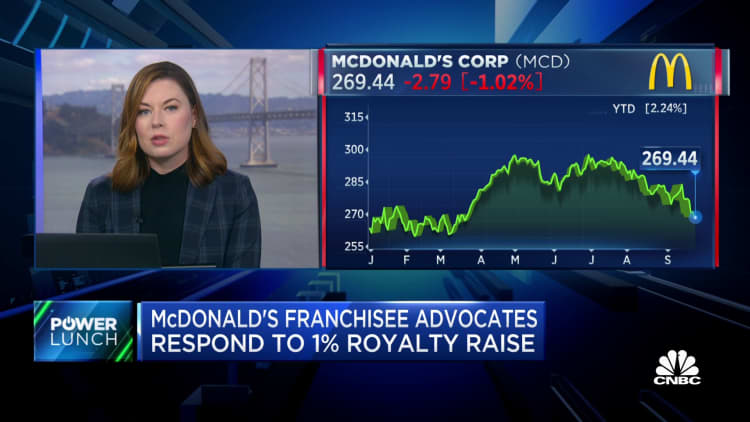
McDonald’s decision to raise royalty fees for the first time in nearly three decades doesn’t mean a wave of franchisees across corporate brands are about to see their cost of doing business go up, but it does underscore the need for business owners to keep up with changes in the franchise business model. The economics of being in the franchise business may, in fact, continue to increase based on a number of factors, from regulation of the industry to the cost of technological adaptation.
In McDonald’s case, the change from 4% to 5%, starting Jan. 1 — which applies to franchisees in U.S. and Canada who add new restaurants, buyers of company-owned restaurants, relocated restaurants and other scenarios that involve the franchisor, but not existing franchisees — brought the fast-food giant more in-line with other restaurant franchises, many of whom already charge royalty fees in the 5% to 6% range, said Kenny Rose, chief executive of franchise investing platform FranShares.
Outside fast food, franchise royalty fees can be even higher, up to 12% or more based on the type of franchise business, according to the International Franchise Professionals Group, a membership-based organization.
Here’s what franchisees need to know about the changing landscape:
Royalty fees could continue to rise
While industry participants said they don’t expect franchisors to raise royalty fees en masse, there could be some franchisors that follow McDonald’s lead, especially if they are below industry norms, said Keith Miller, a principal at Franchisee Advocacy Consulting and spokesman for the American Association of Franchisees and Dealers, a trade association.
In fact, the McDonald’s increase is right on the industry average, according to the International Franchise Association. In the quick-service restaurant space, 62% of brands changed royalties over a 30-year period by an average of 1.3%, according to its data.
For comparison, Wendy’s charges royalty fees in the 4% to 6% range; Burger King charges 4.5% and Subway has a royalty fee of 8% of gross sales, according to information they disclose on their respective websites.
Franchisors are in a race to stay ahead of their own corporate rivals and there is significant value associated with a brand like McDonald’s.
“Franchisors compete against each other for quality franchisees,” said Robert Branca Jr., who owns several Dunkin’ franchises and serves on both the Coalition of Franchisee Associations and the International Franchise Association boards. “Everybody knows who and what McDonald’s is. They have the clout to get a higher royalty fee than a lesser brand.”
That’s not to say all McDonald’s franchisees were happy about the new fee model.
In a letter from a McDonald’s franchisee-owner group shared with CNBC, they noted that their restaurants are generating less cash flow today than they were in 2010 despite what they described as record revenue for McDonald’s Corporation. The owners’ group warned that reinvestment decisions should be reconsidered as it will not provide a historic return and “it’s time for every owner-franchisee to begin focusing on protecting their business, employees and family.”
McDonald’s says 2023 is expected to be one of the highest cash flow years in franchisees’ history.
